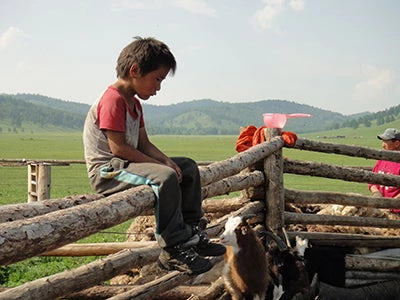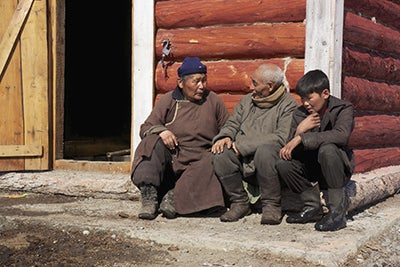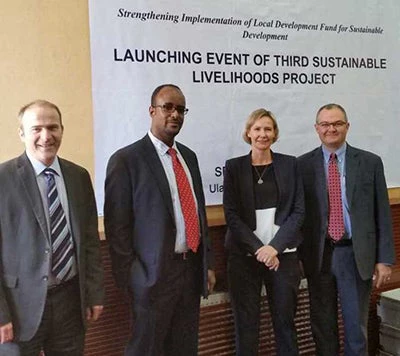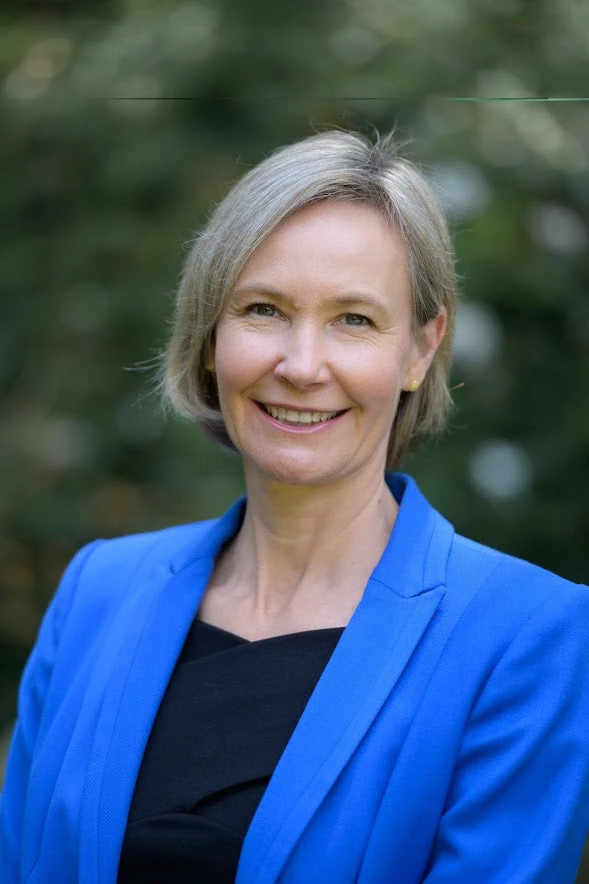In development we want things to go accordingly to plan. We look for tools, guidelines and best practices in our quest for results and impact. But we also know that development is not an exact science and things do not always go according to plan. Changes in government or an economic downturn can quickly make a project design irrelevant.
But in some cases, it does go (more or less) accordingly to plan despite bumps in the road along the way. One such example is the Sustainable Livelihoods Program series in Mongolia, which on September 17, 2015 launched its third and final phase.
Back in 2002, after a series of particularly harsh winters that killed one-third of the livestock in Mongolia and added even more strain to an already impoverished rural population, the World Bank decided to support a new approach to sustainable livelihoods. At that time, the country had little history of community participation in local development planning, and few rural finance options.
 The vision was to place investment funds at the local level and to give the communities a strong voice in the allocation of these funds. Because of the risks associated with the severe winters in Mongolia, pastoral risk management and winter preparedness were to be strengthened. And with a history of inefficient central planning, supporting a policy shift towards greater fiscal decentralization was very important.
The vision was to place investment funds at the local level and to give the communities a strong voice in the allocation of these funds. Because of the risks associated with the severe winters in Mongolia, pastoral risk management and winter preparedness were to be strengthened. And with a history of inefficient central planning, supporting a policy shift towards greater fiscal decentralization was very important.
This vision and core principles were translated into the design of the three-part Sustainable Livelihoods Series, which included piloting, scaling-up and institutionalization phases.
The objective of SLPI (2002-2007) was to achieve an effective approach to promoting improved, secure and sustainable livelihood strategies and to demonstrate and validate the pilot approach in selected areas. SLPII (2008-2013) focused on enhancing livelihood security and sustainability by scaling up those institutional mechanisms and approaches piloted in SPLI. SLPIII, the third and final stage, envisioned an institutionalization of the approaches supported by SLPI and SLPII.
 The first phase successfully piloted different approaches but on a small scale. In the second phase, the project was scaled-up from an initial 16 districts (soums) to nationwide coverage, benefiting 1.75 million people. Given that Mongolia’s population is just below 3 million people and nearly half of them live in the capital,
Ulaanbaatar, the project was able to reach almost everyone in rural areas.
The first phase successfully piloted different approaches but on a small scale. In the second phase, the project was scaled-up from an initial 16 districts (soums) to nationwide coverage, benefiting 1.75 million people. Given that Mongolia’s population is just below 3 million people and nearly half of them live in the capital,
Ulaanbaatar, the project was able to reach almost everyone in rural areas.
Overall, over 6,000 sub-projects were completed with over 90% community satisfaction. Through microfinance development funds, $42 million was lent to over 40,000 borrowers in the rural areas. As a result, 57% more households were able to make winter preparations and more than 36,000 herder families improved their pastoral risk management. Some of the results are captured in this video.
These are concrete and impressive results. But perhaps even more so is the degree to which the program’s principles have been institutionalized. The Integrated Budget Law was passed in 2011, putting into law many of the approaches demonstrated under SLP, such as the Local Development Fund, which puts more funds in the hands of local governments and gives communities a say on how those funds are spent. For a country with a strong history of central planning, this is a significant change in policy direction. The pastoral risk management approaches developed during the course of the program have been formally adopted by the land agency. And the Micro-Credit Development Fund is fully self-financing and operating independently.
Several other World Bank interventions were spun off the SLP program, including the Rural Education and Development Project, and the Index-Based Livestock Insurance Project.
 The last and final part of the SLP journey has started (see a link to the
press release). Changes and delays have made the road bumpy and at times difficult. The program’s approach evolved and was fine-tuned during the journey. But in spite of these, the vision and the principles remain the same. And the support for that vision and those principles remain intact.
The last and final part of the SLP journey has started (see a link to the
press release). Changes and delays have made the road bumpy and at times difficult. The program’s approach evolved and was fine-tuned during the journey. But in spite of these, the vision and the principles remain the same. And the support for that vision and those principles remain intact.
Photo: Former SLP task team leaders (Andrew Goodland, and Nathan Belete also Practice Manager) and current TTL (Helene Carlsson Rex) with Country Manager (Jim Anderson) at the September 17th, 2015, project launch in Ulaanbaatar.
But in some cases, it does go (more or less) accordingly to plan despite bumps in the road along the way. One such example is the Sustainable Livelihoods Program series in Mongolia, which on September 17, 2015 launched its third and final phase.
Back in 2002, after a series of particularly harsh winters that killed one-third of the livestock in Mongolia and added even more strain to an already impoverished rural population, the World Bank decided to support a new approach to sustainable livelihoods. At that time, the country had little history of community participation in local development planning, and few rural finance options.
 The vision was to place investment funds at the local level and to give the communities a strong voice in the allocation of these funds. Because of the risks associated with the severe winters in Mongolia, pastoral risk management and winter preparedness were to be strengthened. And with a history of inefficient central planning, supporting a policy shift towards greater fiscal decentralization was very important.
The vision was to place investment funds at the local level and to give the communities a strong voice in the allocation of these funds. Because of the risks associated with the severe winters in Mongolia, pastoral risk management and winter preparedness were to be strengthened. And with a history of inefficient central planning, supporting a policy shift towards greater fiscal decentralization was very important.
This vision and core principles were translated into the design of the three-part Sustainable Livelihoods Series, which included piloting, scaling-up and institutionalization phases.
The objective of SLPI (2002-2007) was to achieve an effective approach to promoting improved, secure and sustainable livelihood strategies and to demonstrate and validate the pilot approach in selected areas. SLPII (2008-2013) focused on enhancing livelihood security and sustainability by scaling up those institutional mechanisms and approaches piloted in SPLI. SLPIII, the third and final stage, envisioned an institutionalization of the approaches supported by SLPI and SLPII.
 The first phase successfully piloted different approaches but on a small scale. In the second phase, the project was scaled-up from an initial 16 districts (soums) to nationwide coverage, benefiting 1.75 million people. Given that Mongolia’s population is just below 3 million people and nearly half of them live in the capital,
Ulaanbaatar, the project was able to reach almost everyone in rural areas.
The first phase successfully piloted different approaches but on a small scale. In the second phase, the project was scaled-up from an initial 16 districts (soums) to nationwide coverage, benefiting 1.75 million people. Given that Mongolia’s population is just below 3 million people and nearly half of them live in the capital,
Ulaanbaatar, the project was able to reach almost everyone in rural areas.
Overall, over 6,000 sub-projects were completed with over 90% community satisfaction. Through microfinance development funds, $42 million was lent to over 40,000 borrowers in the rural areas. As a result, 57% more households were able to make winter preparations and more than 36,000 herder families improved their pastoral risk management. Some of the results are captured in this video.
These are concrete and impressive results. But perhaps even more so is the degree to which the program’s principles have been institutionalized. The Integrated Budget Law was passed in 2011, putting into law many of the approaches demonstrated under SLP, such as the Local Development Fund, which puts more funds in the hands of local governments and gives communities a say on how those funds are spent. For a country with a strong history of central planning, this is a significant change in policy direction. The pastoral risk management approaches developed during the course of the program have been formally adopted by the land agency. And the Micro-Credit Development Fund is fully self-financing and operating independently.
 The last and final part of the SLP journey has started (see a link to the
press release). Changes and delays have made the road bumpy and at times difficult. The program’s approach evolved and was fine-tuned during the journey. But in spite of these, the vision and the principles remain the same. And the support for that vision and those principles remain intact.
The last and final part of the SLP journey has started (see a link to the
press release). Changes and delays have made the road bumpy and at times difficult. The program’s approach evolved and was fine-tuned during the journey. But in spite of these, the vision and the principles remain the same. And the support for that vision and those principles remain intact.
Photo: Former SLP task team leaders (Andrew Goodland, and Nathan Belete also Practice Manager) and current TTL (Helene Carlsson Rex) with Country Manager (Jim Anderson) at the September 17th, 2015, project launch in Ulaanbaatar.


Join the Conversation